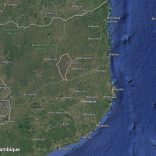Mozambique Pavilion at Expo Osaka reaches one million visitors
Mozambique: INAGE regains control of government web pages – AIM report

Photo: O País
Mozambique’s National Institute of Electronic Government (INAGE) has regained control of over 20 web pages with relevant data for public use, after a cyberattack on Sunday by unknown hackers, which left most of the pages partly or totally deactivated.
After the attack, most of the web sites could not be accessed by users and only displayed a warning stating “Hacked by Yemeni Hackers”.
The websites of the government’s relief agency, the National Institute for Disaster Risk Management (INGD), the National Roads Administration (ANE), the Southern Regional Water Board (ARA-Sul), the National Road Transport Institute (INATRO) are among the institutions whose pages were hacked.
Addressing a press conference on Monday in Maputo, the INAGE Director General, Emilio Jasse, said that as soon as the institute’s technical staff realised there was a cyberattack they immediately launched a counteroffensive to shield the settings of the hacked web sites and check security.
“There was a cyberattack spotted by our monitoring systems, especially the ones from the Cyber Security Board,” Jasse said, adding that after the operation was successfully concluded, the service was restored on Monday afternoon and most of the pages are again accessible.
The cyberattack targeted only one of the 200 servers installed to the database. Jasse explained that the hacked server was immediately switched off as a precautionary move, as envisaged on the safety protocol.
“The server was offline and the move panicked public users who tried unsuccessfully to access the web pages,” Jasse stated, adding that they had been deliberately switched off in order to enable a much better control of the restoration process. Now the server is online and the pages available.
Cyberattacks, he said, happen every so often but INAGE technical staff manage to foil most of them. As for the attacks against the web pages, Jasse guaranteed that there is no danger to individuals since the information contained is already in the public domain. He insisted that there was no loss of personal data.
Jasse assured reporters that the hackers did not demand any ransom. He said this was one of the more successful cyberattacks against government webpages. The others are unsuccessful because they are immediately and promptly foiled.
This hacker group calls itself the “Yemeni Cyber Army”, and is believed to be based in Iran. Previously its main targets have been sites of the Saudi Arabian regime.













Leave a Reply
Be the First to Comment!
You must be logged in to post a comment.
You must be logged in to post a comment.